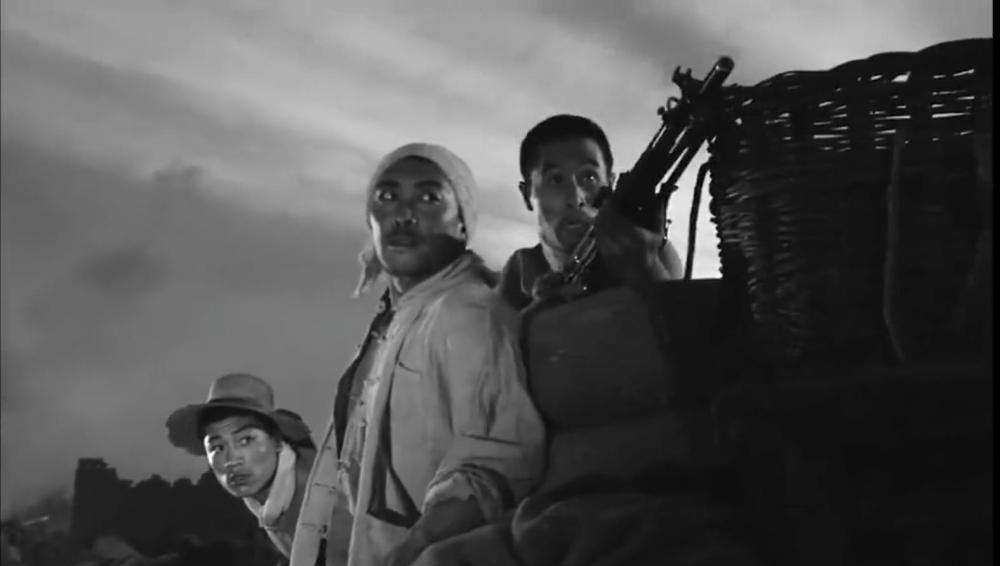When I was a child watching the movie "Little Soldier Zhang Ga", around the 87th minute, Uncle Luo and the district captain took someone into the devil's gun tower and prepared to rescue Gazi, but was unexpectedly discovered by the devil. The Devil Squad Leader shouted, "What drip work?" District Captain: "Hygienist Xinjiang's work." "After saying that, he raised his hand and shot to knock the devil down." This sentence has plagued me for decades, obviously the district captain, why do you call yourself a hygienist? Why is it said that Baiyangdian is from Xinjiang? It wasn't until I learned some Japanese years later that I solved the mystery.

[The district captain shouted before shooting: hygienists working in Xinjiang]
1963's "Little Soldier Zhang Ga" is a very distinctive children's theme feature film, creating the image of a young hero Zhang Gazi who fought with the devils in Baiyangdian, and this film can be said to be the childhood memories of many people. The anti-Japanese dramas of that era all had a common feature, that is, the ghosts in the play all spoke a strange and unpopular Japanese language. For example, "Yours, what's the job?" "Your conscience is greatly broken. "Quietly enter the village, don't shoot." "Yo Sis, what's the flower girl's?" ”
Many people think that this may be that the crew deliberately installed this kind of unspeakable way of speaking for them in order to ugly the little devils. In fact, at that time, there was really such a language, it was "concord". After the Japanese occupation of Tohoku, they could not wait to promote the Japanese language in the local area, and Japanese became a compulsory course in primary and secondary schools. However, it takes a lot of time to learn Japanese for all, and in order to speed up the digestion of Tohoku, a mixture of Chinese and Japanese language variants has emerged. This language variant is written and read in Kanji, but uses Japanese grammar to express the meaning of Japanese. For example, "tatami" is actually "straw mat" in Japanese.
【Some concord sentence patterns】
As a result, a large number of "Japanese" that we are familiar with were born, such as "Yosai", "Misimisi", "Dead La", "Hi Yi", "Baga Pressure Road", etc., in fact, some of these are not Japanese, but variants of Japanese misinformation. For example, in Japanese, eating is not "Missy", but "Pot Khan Oh Taberu". However, there is a kind of rice whose name is pronounced "Misi", which was later misinformed as "Missy", so eating became "Missy".
Although concordia is Chinese ideographic, it is grammatically Japanese. For example, Kawamura Kiyoshi's "Overview of Manchurian Agriculture" compiled in 1939: "All the goods that life needs for food, clothing, shelter, and everything can be supplied with soybeans!" ...... Soybeans are of great use and need to be grown extensively. "It's basically the same tone of voice as the little devils in the movie.
[The Eighth Route Army speaks Japanese to the Japanese little girl]
The true Concordia language has only been spoken in the Tohoku region historically, and after the surrender of Japan, the Concordia language disappeared from the Tohoku region, and there is no evidence that the Concordia language was also used in large quantities in Kannai, such as the Baiyangdian region where Gazi is located. But in almost all the anti-war movies of the sixties and seventies, the little devils talked like this. For example, everyone is most familiar with "you drop, eight way drop work?" Dead dead! ”
Since the little devils in the play are all in harmony, it is understandable that other characters occasionally use it. For example, the district captain said that "the work of the hygienist in Xinjiang", which is actually too fast to listen to the emotion, the district captain really said "the work of the new hand of the health pill". "Hygiene pill" is the Japanese meaning of "bullet, projectile", in Japanese, Shinjo is the Japanese "enter, offer (しんじょう)", so "hygiene pill Shinjo" is an authentic Japanese, meaning to send bullets, here can be understood as "please eat the gun", in honorifics "please eat the gun" plus the grammar of the Concordia, a classic "health pill new handicap work" was born.
It is said to be classic because it not only appears in "Little Soldier Zhang Ga", but also in the mouth of Li Xiangyang of "Plain Guerrilla". The main creators of that era had a great life experience, and such a golden sentence would never be imagined out of thin air, which can only show one problem, that is, it may be the most commonly used Japanese language when the real Eighth Route Army was facing the devil.